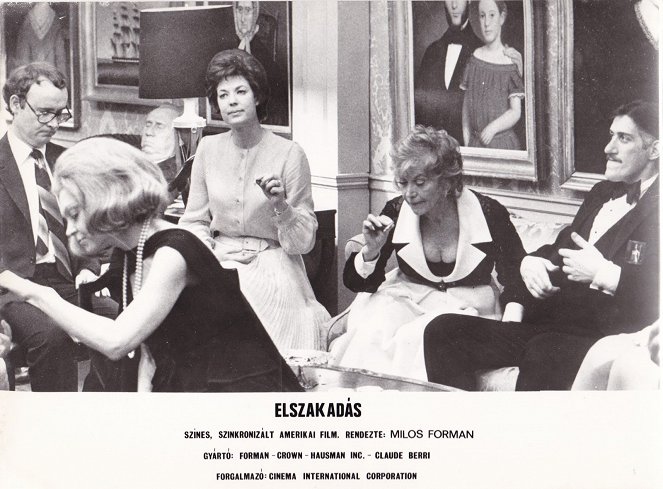Réalisation:
Miloš FormanPhotographie:
Miroslav OndříčekActeurs·trices:
Lynn Carlin, Buck Henry, Georgia Engel, Tony Harvey, Audra Lindley, Paul Benedict, Vincent Schiavelli, Tina Turner, Philip Bruns, Allen Garfield (plus)Résumés(1)
Larry Tyne traverse une crise de la quarantaine bien canalisée par son psy, et son épouse Lynn joue parfaitement son rôle de femme au foyer de la moyenne bourgeoisie newyorkaise. À plusieurs reprises, leur fille Jeannie fugue pour rejoindre un groupe de jeunes gens rassemblés autour d'idéaux alternatifs tels que la folk music, la libération sexuelle et les drogues douces. Lorsque Larry part retrouver sa trace à travers Manhattan, il découvre toute une population déviante, fait l'expérience de nouveaux mondes, de nouveaux lieux, et intègre un important réseau associatif de parents à la recherche de leurs enfants disparus... (Carlotta Films)
(plus)Critiques (3)
At the time I’m writing this, I haven’t seen everything Miloš Forman has done, so I won’t pretend to be an expert on his work. But what I have seen, I’ve genuinely loved, and I’m proud of what this Czech filmmaker achieved in America—it's rare to see that kind of global success outside of the sports world. So naturally, I decided to dig deeper into his filmography, and Taking Off was one of the first on my list. The film kicks off with a very 70s, hippie vibe—20 minutes of chaotic singing, yelling, and some hilariously off-key performances by a bunch of girls. It was a little tough to get through, I’ll admit, but once the story kicked in, I found it pretty intriguing. By the end, it had some serious momentum, with a standout scene involving a very humorous and insightful "lesson" on smoking weed that was just perfect. Once again, Forman showcases his talent for exploring the raw emotions people often keep hidden, the kind that are tough to express, even to those closest to us. While Taking Off didn’t resonate with me as deeply as some of his other films, it was still a fascinating watch and a great glimpse into his ability to balance humor with heartfelt moments.
()
The socio-cultural boom that hit America in the 1960s never particularly appealed to me, so the only film that I think fit best into that era was Forrest Gump. When I saw Miloš Forman's Hair earlier, the only thing that attracted me to it was its form. But you also can't say that about Taking Off. For me, it became just a one-and-a-half-hour-long narrative about family conflicts, running away from home, parental narrow-mindedness, and exemplary marijuana smoking. Throughout the entire film, I was just watching something with an apathetic expression that didn't interest me at all and was boring overall. I'm surprised that I didn't turn it off. To fully appreciate the film, perhaps a greater understanding of certain "cultural values" and "social rules" is needed. But no matter how hard I try, I can't find that understanding. Maybe I should grow up.
()
Miloš Forman moved across Western Europe to the United States and did there what he had done best in Czechoslovakia. He filmed people. He first studied them and then he extracted exactly the right moments that will look good on the screen and make you think. Although the scene with the joint probably sticks most in your head, there are more memorable scenes that offer insights into the Americans of the time.
()

